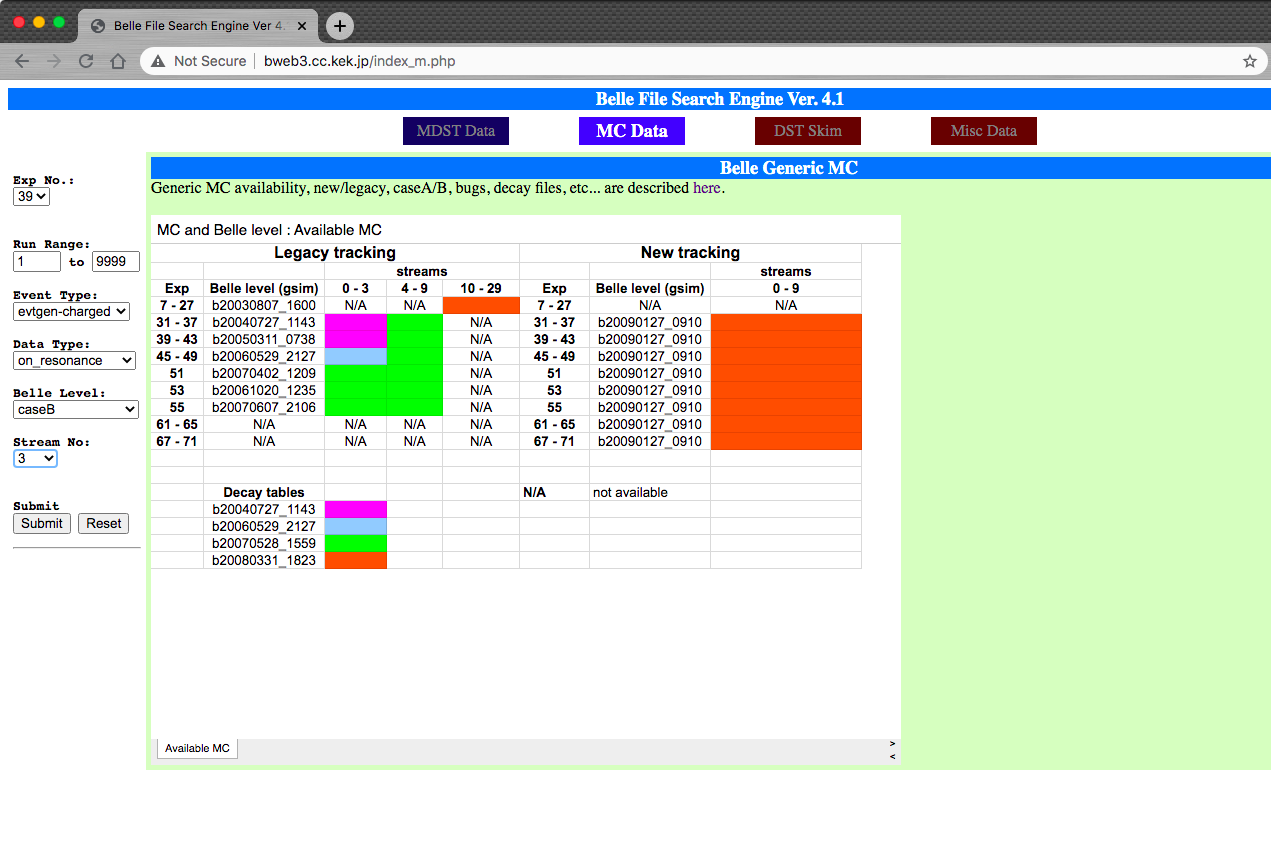8.4. Belle MDST samples#
The most important argument in convertBelleMdstToBelleIIMdst function is the first
one, specifying the input Belle MDST sample to be converted and analysed. You can
either specify the location of the input Belle MDST file (e.g. when running over
your privately produced signal MC):
convertBelleMdstToBelleIIMdst('/location_to_my_mdst_files/myMDSTFile.mdst', path=mypath)
or specify the url of real data or generic MC samples. For example:
convertBelleMdstToBelleIIMdst('http://bweb3/montecarlo.php?ex=37&rs=100&re=200&ty=evtgen-mixed&dt=on_resonance&bl=caseB&st=0', path=mypath)
The form of the url is the same as used in BASF. More information is available at the Belle analysis software page.
Note
Belle index files cannot be used in the conversion, please use HadronB(J) skim files, or convert your index files to mdst files first and then perform b2bii conversion.
There are different kind of MC/data samples available at Belle.
8.4.1. Belle Data and Generic MC#
Generic MC is the official MC samples at Belle, which was generated with
run-dependent beam background. There are multiple streams of these samples,
and each stream contains the same amount of events as present in the real
Belle data.
There are several different categories of Belle MC: - Generic \(B\) samples : charged (\(B^+ B^-\)) and mixed (\(B^{0}\bar{B}^{0}\)) - Continuum samples : uds, charm - Y(5S) samples : bsbs, nonbsbs
Generic \(B\) samples only contain decay modes with \(b \to c\) quark transitions, and have been generated based on the decay tables at
/sw/belle/belle/b20090127_0910/share/data-files/evtgenutil/DECAY.DEC.
How to find Generic MC and data samples?#
You can find the sample(s) you want through Belle File Search Engine
Warning
Belle File Search Engine is only accessible within KEK domain or via VPN. Or look in the SSH - Secure Shell tutorial for a way to access it via SSH forwarding.

Fig. 8.1 The Belle File Search Engine#
By specifying Exp No, Event Type, Data Type, and Stream No,
Event Type means different MC types (charged, mixed, uds, .. ).
Data Type is for different energy runs (on-resonance, off-resonance, …).
In total there are 10 streams of Generic \(B\) samples and 6 streams of
continuum samples.
You can either use the file list (physical path) or URL as input file list for b2bii jobs.
See also
More information about official MC and data can be found here
8.4.2. Rare B MC#
Just from this name you can guess that this type of MC aims for rarer processes, such as \(b \to u \ell \nu\), \(e^+ e^- \to \tau^+ \tau^-\)…
Rare \(B\) MC was generated with an experiment-dependent beam energy, but not run-dependent (i.e. The same beam energy and IP profile in the same experiment).
The location of those special MC files can be found here.
8.4.3. Generating MC sample#
There are two parts when generating a MC sample:
Users can choose between basf or B2BII to generate a set of signal MC for one’s analysis.
Generating signal MC with basf#
The mcproduzh package has been used to generate signal MC in Belle for many years.
This package was developed by Ushiroda-san, A. Zupanc, and Horii-san, and
it consists of generation, simulation, and reconstruction based on evtgen and
gsim scripts (gsim is Belle slang for the simulated detector response
that results from the use of Geant3 within the Belle analysis software
framework basf – the output of gsim scripts are Belle mdst files).
It will create MC samples for a list of experiments, normalized by their \(N(B\bar{B})\) or integrated luminosity.
The beam energy, IP profile, and detector configuration of this MC will be
experiment-dependent, but not run-dependent.
Moreover, RunNo for these events will be set to 0 in the mcproduzh package,
hence it doesn’t work for off-resonance or \(\Upsilon(nS)\).
If one wants to generate run-dependent MC samples, gsim/gsim/gsim.*.dat have
to be modified with corresponding RunNo accordingly.
See also
More information of generating Belle MC in basf can be found
here
Generating signal MC with B2BII#
Signal MC samples can also be generated in basf2, using the BelleMCOutput module.
An example script of how to generate a MC sample with BelleMCOutput is at
ls $BELLE2_RELEASE_DIR/b2bii/examples/BelleMCGeneration.py
Here are several notes while using BelleMCOutput.
Beam energy for MC generation
The default global tag for analysis jobs is B2BII_MC; however, this does not take into
account beam smearing.
Therefore, for the MC generation one must use b2bii_beamParameters_with_smearing.
# Use B2BII global tag.
basf2.conditions.prepend_globaltag('b2bii_beamParameters_with_smearing')
Run dependent MC
If you like to generate run-dependent beam energy MC for non-\(\Upsilon(4S)\) analysis, please contact conveners of your physics subgroup at Belle to get more information regarding the list of runs for your analysis.
Then modify the following line in your generation script:
# Generate for experiment 55, run 402 (run-dependent MC).
main.add_module('EventInfoSetter', expList=55, runList=402, evtNumList=100)
This will generate signal MC using the beam energy from run 402 in experiment 55.
Simulation with run-dependent MC
If one wants to generate run-dependent MC samples, gsim/gsim/gsim.*.dat have
to be modified with corresponding RunNo accordingly.
For example, in gsim/gsim/gsim.55.dat under mcproduzh:
C Set run number (format "RUNG IDRUN IDEV")
C Run# = 0 : for run-independence MC
C Run# != 0 : for run-dependent MC
RUNG 0 1
one need to modify .dat file to set up the correct RunNo as:
C Set run number (format "RUNG IDRUN IDEV")
C Run# = 0 : for run-independence MC
C Run# != 0 : for run-dependent MC
RUNG 402 1
Warning
If RunNo is not correctly set in gsim.*.dat, it will be overwritten by gsim.
As a result, incorrect beam energies will be used for your MC files.
User signal decay files
To generate user-defined decay files (aka signal decay files), use the following line in the script:
from generators import add_evtgen_generator
add_evtgen_generator(path=mypath,
finalstate="signal",
signaldecfile="user_defined_decfile.dec"
)
Note
Because the Belle detector geometry is not and will not be implemented in basf2, the simulation part can
only be done in basf.